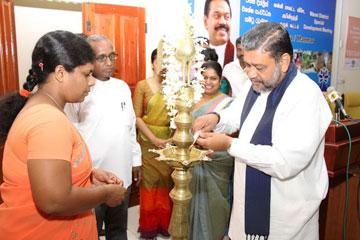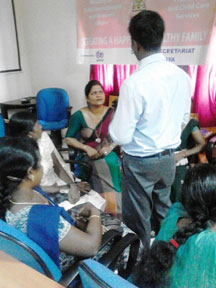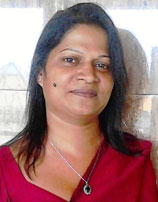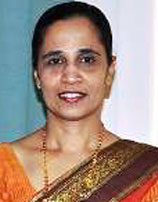|
Probation and Child Care Services Department acts on
LLRC recommendations:
Creating a happy, healthy family for ex-child combatants
By Ranil Wijayapala
 |
|
Child Development and
Women's Affairs Minister Tissa Karaliyadda |
With the ending of the war against terrorism, the country was left
with the daunting task of returning to a safe and stable situation.
Though it was a difficult task, the country has been able to face the
challenging tasks effectively during the past five years after
transforming the Northern and Eastern provinces through the
reconstruction process by the Government.
Some 594 ex-child combatants were subjected to rehabilitation and out
of them 272 ex-child combatants have undergone formal education and 322
have undergone vocational training during their rehabilitation.
Those who have undergone rehabilitation as ex-child combatants are no
longer in their childhood as they have become adults and leading married
lives after their reintegration into the society. But it seems they are
now facing problems when caring for their children as adult parents.
 |
|
Rehabilitated beneficiaries
participating in the awareness program |
The task of taking care of these rehabilitated and reintegrated
ex-child combatants has been entrusted with the Department of Probation
and Child Care Services under the Ministry of Child Development and
Women Affairs. The Lessons Learnt and Reconciliation Commission in its
recommendations also has entrusted this task with the Probation and
Child Care Services Commissioner to conduct programs for the better
socialisation of these ex-child combatants who have been rehabilitated
and reintegrated into the society.
Talking to the Sunday Observer about the problems faced by the
ex-child combatants who return to the society after their reintegration,
Yamuna Perera, Commissioner, Department of Probation and Child Care
Services, said that through their officers scattered in the North and
East they have observed that those ex-child combatants are facing
difficulties when handling their normal life as young adults and fathers
and mothers.
"They are a set of people who were deprived of their childhood.
Instead of the toys and books they had to hold guns in their hands and
kill the people whom they think were their enemies. So they have no
experience about a pleasant childhood. Though we could adopt them to the
normal society through the rehabilitation process they are facing
difficulties when caring about their own children as young parents", she
said.
 |
Thushara
Wickremasinghe, Child Rights Promotion
Officer |
 |
| Yamuna Perera,
Commissioner, Department of Probation and Child Care Services. |
"We have identified that many of these ex-child combatants are
unaware of the child caring practices and how to speak to their
children. They are trying to treat their children also in the same
manner they were treated as child combatants. Since they have not
undergone a proper education they also do not want to provide proper
education for their children. So they are facing difficulties in running
a happy and healthy life in normal society", she said.
Therefore, the Probation and Child Care Services Department which
undertook the responsibility of following up their progress in the
society along with the other Non Government Organisations is planning to
address the issues faced by the ex-child combatants along with the
communities who are facing similar problems in the society.
"Through these programs we intend to bring their mentality out from
their earlier thinking pattern and make them aware how to lead happy and
healthy family life without allowing them to treat their children in the
similar way they were treated by their adults", she said.
"These ex-combatants are also facing difficulties when dealing with
the other people due to the different attitude people are having towards
them. Therefore we are programming for the better socialisation of
ex-combatants, provide guidance to minimise the mental disorders and
complex problems, make them aware of the childcare and also to protect
and strengthen the family economy", she said.
To implement this program the Probation and Child Care Services
Department through their Child Rights Promoting Officers with the
assistance of the Bureau of the Commissioner General of Rehabilitation
identified persons in need of such awareness, and are planning to
conduct programs to update their knowledge.
"Through these programs we are trying to create an environment for
identified ex-combatants and rehabilitated beneficiaries to work with
happiness and satisfaction after releasing their mental stress.
Thus this program will create a child friendly environment for the
children of these ex-combatants to lead a happy life", the Commissioner
said.
Child Rights Promotion Officer Thushara Wickremasinghe who
coordinates the program targeting the ex-child combatants said that
through their awareness programs they expect to discuss the way how they
are identifying family well-being and well-being of the children.
Through these awareness programs professionals will discuss how to
identify the factors which will affect the well-being of both families
and children through interactive sessions with the participation of the
ex-combatants mixing with the other civilians facing similar problems.
"Our Child Rights Promotion Officers scattered around the North and
East are trying to address their issues using case management tools,
arranging family group conferences and counselling sessions", she said.
"As the first step towards addressing their problems we are
conducting common awareness programs in all the districts in the North
and East with the financial assistance of UNICEF", she said.
The first such program was conducted on August 26 in Vavuniya with
the participation of Child Development and Women's Affairs Minister
Tissa Karaliyadda. Vavuniya District Secretary Bandula Harishchandra,
UNICEF Program Coordinator Mohamed Irham also participated in this
program.
Dr. Manoj Fernando from University of Rajarata and Dr. Menaka
Sivakaran from the University of Jaffna also addressed the rehabilitated
beneficiaries.
"After conducting initial awareness programs we are planning to
conduct the follow up programs to provide financial assistance to start
self-employment projects based on the vocational training programs they
have undergone during their rehabilitation programs", Thushara said.
"Many of these ex-combatants have undergone vocational training
programs during their rehabilitation process.
We are trying to help them financially after refreshing their skills
through one day two days programs conducted through the Industrial
Development Board or "Vidatha Centres", she said.
Apart from these programs the Child Rights Promotion Officers
scattered in the North and East also can provide assistance for these
families to improve their socio economic level and also provide required
support for the children to continue their education by supplying them
with books and other requirements to pursue their education.
"Through all these programs we are trying for the successful
socialisation of these ex-child combatants enabling them to lead happy
and healthy family lives", she said. |

